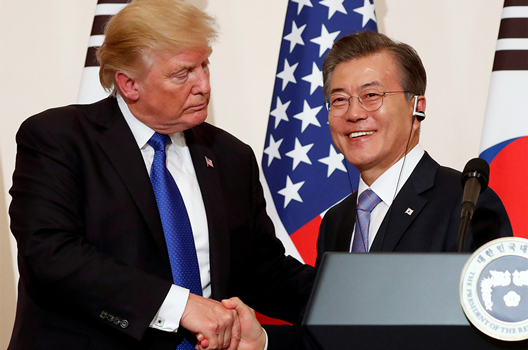 US President Donald J. Trump must use his meeting with South Korean President Moon Jae-in to ensure that the United States and South Korea are completely aligned, with no differences that could be exploited by North Korean leader Kim Jong-un in his upcoming summit with Trump.
US President Donald J. Trump must use his meeting with South Korean President Moon Jae-in to ensure that the United States and South Korea are completely aligned, with no differences that could be exploited by North Korean leader Kim Jong-un in his upcoming summit with Trump.
In this way, Trump’s May 22 meeting with Moon will serve as an important prelude to the US-North Korea summit, scheduled for June 12.
After a year of nuclear tensions and harsh rhetoric, the process leading to a deal between Washington and Pyongyang will not be easy, and could be interrupted in a variety of ways. This dynamic was exemplified by North Korea’s cancellation of a planned meeting with South Korea out of anger over joint South Korea-US air force drills, announced on May 16 by Kim Kim Kye-gwan, a vice foreign minister of North Korea. He followed up the statement with a threat to cancel the Trump-Kim summit.
North Korea is a very poor, small country, but Kim Jong-un wants the United States and the international community to treat him as the leader of a normal state. He is in full control of his military and people, and Pyongyang has claimed that it has achieved a nuclear and ballistic missile capability that can reach US territory. In light of these considerations, Kim believes that now is the time to come to the negotiating table with the Trump administration.
This belief is fueled by Kim’s perception that North Korea has evolved and advanced in terms of its nuclear capacity to the degree that it can sit as an equal at the negotiating table with the United States. Therefore, Kim Kim Kye-gwan’s statement shows Pyongyang’s discomfort with the Washington’s continued treatment of North Korea as a subordinate nation. The threatened cancellation is a long-standing pattern of North Korea’s negotiating tactics, which tend to drag on until the last minute that they decide what they do accept and do not.
South Korea dealt with North Korea much longer than the United States, and knows more about North Korea and the Kim family. Trump should take advantage of this unique perspective. In their meeting, Moon can help Trump better prepare for the upcoming summit by providing valuable insights about Kim’s intentions as well as North Korea’s tactics and behavioral patterns in terms of negotiations. While Trump has proved himself adept at reading his counterparts in past negotiations, Moon can help him do that in this unique situation. However, Moon should not try to script Trump, but rather provide the information necessary to help him walk away from the June 12 negotiations one step closer to the denuclearization of the Korean peninsula.
Moon should be able to share information and items discussed during the North-South Korea Summit in April, but not included in the written statement of the Declaration. He spoke with Trump over the phone immediately after that summit to share his account of the events, but in person he could better describe what it was like to spend time with Kim, and why he thinks this North Korean leader is different from his father and grandfather.
Intensive preparations are underway by all actors in advance of the historic summit between Trump and Kim. Both South Korea and the United States view this, the first meeting of a North Korean leader and sitting US president, as the opportunity of the century. Both Washington and Seoul agree that this is likely the best, and maybe the only, chance to pressure North Korea into giving up its nuclear weapons. Both Trump and Moon are willing to make concessions to close the deal, but a number of the proposed concessions are not agreed upon by the negotiating counterparts. Ultimately, both countries should recognize that the ROK-US alliance is fundamental to maintaining security on a denuclearized peninsula, and the meeting between Trump and Moon should only deepen that cooperation and understanding ahead of trying negotiations with North Korea.
Miyeon Oh is a senior fellow at the Asia Security Initiative in the Atlantic Council’s Scowcroft Center for Strategy and Security.
Image: US President Donald Trump and South Korean President Moon Jae-in shake hands at a news conference at South Korea’s presidential Blue House in Seoul, South Korea, November 7, 2017. (REUTERS/Jonathan Ernst/File Photo)
